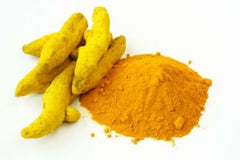
In a recent article published by FoxNews.com, Chris Kilham, a medicine hunter who researches natural remedies all over the world, touts the benefits of curcumin, a powerful substance found in turmeric. Turmeric, also known as Curcuma longa, has a wide range of uses in food, cosmetics and medicine. For thousands of years, the people of India have used turmeric to treat a variety of ailments ranging from asthma and allergies to diabetic wounds. Turmeric is often found in the foods on our table, such as mustard and curry dishes. So what makes turmeric a beneficial ingredient for people with psoriasis and eczema?
Turmeric contains a compound called curcumin. This yellow-colored substance contains antioxidant, anti-carcinogenic and antimicrobial properties as well as liver-protective, heart-protective and anti-arthritic benefits. It also protects the body’s cells from free-radical damage.
Perhaps the most notable and powerful benefit of turmeric and curcumin are curcumin’s anti-inflammatory powers. Inflammation is a common problem for psoriasis and eczema sufferers. Like ibuprofen and acetaminophen, curcumin inhibits the body’s COX2 enzyme. However, according to Kilham, curcumin goes much further than these commonly used medications in reducing pain and inflammation, by affecting the activities of other key factors, including NF-kappaB, PPAR Gamma transcription factors, and 5-LOX. These extra benefits appear to make curcumin an even more powerful anti-inflammatory than many over-the-counter pain and anti-inflammatory medications.
Is turmeric safe? Good news: studies conducted on animals and humans have not discovered any dangers or toxicities associated with the use of turmeric or curcumin (even in very high doses).
How do you use turmeric? Turmeric can be used in cooking or taken in the form of turmeric or curcumin supplements. If you find that curcumin upsets your stomach, discontinue use immediately. As always, we recommend consulting with a health professional before trying a new diet or any form of treatment for your skin.

Leave a comment